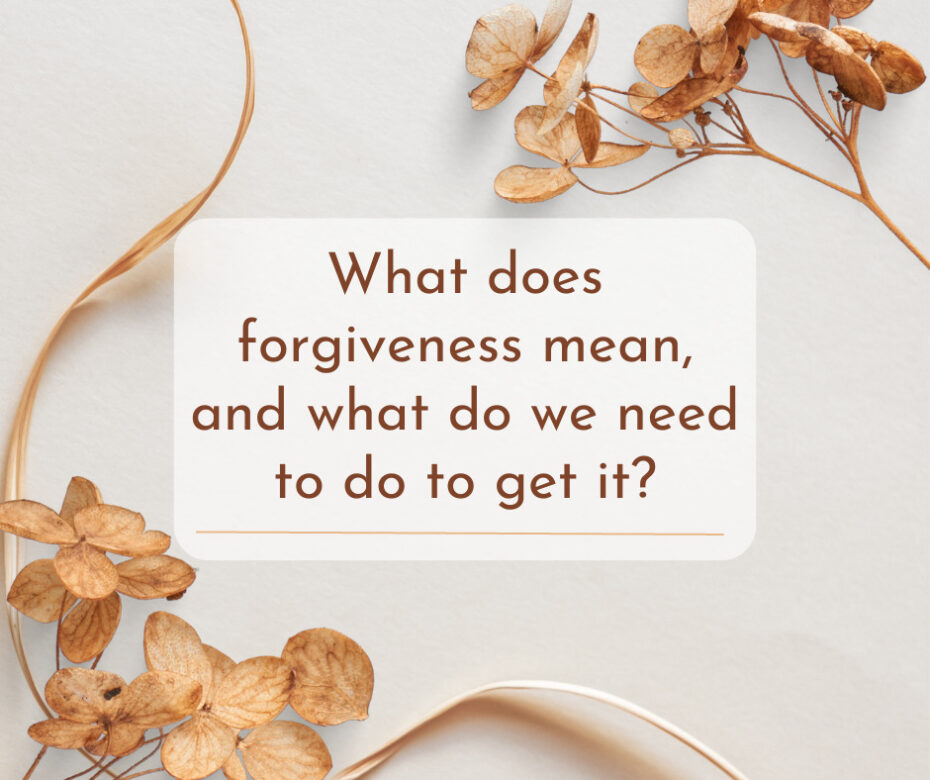Robert asks several questions relating to the forgiveness of sins.
First, how does forgiveness tie in with confession and repentance?
Second, if we don’t confess our sins, are we forgiven?
Third, what does forgiveness mean?
Fourth, will God forgive us if we do not think we have committed a transgression?
Good questions.
First, we know from 1 John that the condition for ongoing fellowship with God is walking in the light of God’s Word (1 John 1:7) and confessing our known sins (1 John 1:9). The words repent and repentance do not occur in 1 John. Since the purpose of the letter is that we would have ongoing fellowship with God (1 John 1:3-4), then repentance must not be a condition for forgiveness and fellowship for the one already walking with God.
Confession is not some magic mantra. Confession is agreeing with God that what we said or did was wrong and that we wish to keep walking in fellowship with Him. There is an element of turning from sins when we confess. However, it is not called repentance in 1 John. I believe the reason is that the person already walking in fellowship with God is grieved when he realizes he has sinned. His confession indicates an acknowledgment that he desires to please God.
We know from Luke 15 that when a believer strays away from the Lord and is out of fellowship with Him, he must repent–that is, turn from his sins–in order to get back into fellowship. The condition for forgiveness and fellowship for any believer away from the Lord is repentance, not confession of sins. Let’s say a believer prays and says, “Lord, I am away from You, and I’ve committed many sins, including this, that, and that. Please forgive me. I will continue living this way, but I want Your forgiveness.” Would God forgive him? No. Because he is walking in the darkness, not the light. He is living in a place far from God.
Second, if we are walking in the light and we confess the sins of which we are aware, God forgives us of those sins and cleanses us from the ones we do not realize are sins (1 John 1:9). We are forgiven and cleansed from “all unrighteousness” as long as we confess our known sins to God.
Third, forgiveness is a fellowship concept. If a wife sins against her husband and he does not forgive her, then they are estranged. They are out of fellowship. A husband should–but may not–forgive his wife if she is repentant. God, however, is committed to forgiving us if we meet the condition for forgiveness.
Fourth, as long as we are walking in the light and confessing our known sins, God will forgive us if we do not realize that what we did or said was a sin. However, this question requires more discussion.
Robert, I will need to take this to part 2 because there is much more to 1 John 1:5-10 than I’ve discussed thus far. I have not yet touched on three false claims a believer may make (1 John 1:6, 8, 10) that indicate he is not in fellowship with God. Those three false claims are directly related to your fourth question.
To summarize: A believer in fellowship with God stays in fellowship by confessing his known sins. Whenever he confesses, he gets forgiveness for all his sins, and he remains in fellowship. The believer who is out of fellowship with God needs to turn from his sins in order to gain forgiveness and get back into fellowship. Forgiveness means that we are in harmony with God (or in harmony with another human in human-to-human forgiveness).
In part 2, we will consider the three false claims that keep a person from being in fellowship with God.


